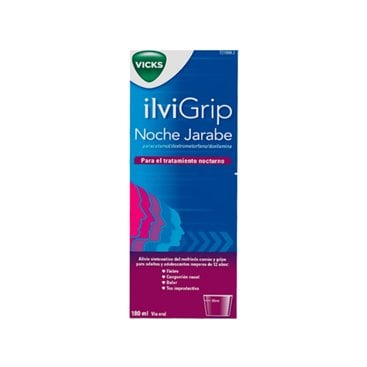Ilvigrip Night Syrup 1 Bottle 180 Ml
IlviGrip Night is a combination of paracetamol, dextromethorphan hydrobromide and doxylamine succinate. It is indicated in adults and adolescents from 12 years of age for the symptomatic relief of the common cold and flu that present with pain or fever, nasal congestion and unproductive cough (irritative cough, nervous cough). Especially indicated for night treatment.
IlviGrip Night is a combination of paracetamol, dextromethorphan hydrobromide and doxylamine succinate. It is indicated in adults and adolescents from 12 years of age for the symptomatic relief of the common cold and flu that present with pain or fever, nasal congestion and unproductive cough (irritative cough, nervous cough). Especially indicated for night treatment.
Ilvigrip Night (Syrup 1 Bottle 180 Ml)
ACTION AND MECHANISM
Association with analgesic, antipyretic, antitussive and H1 antihistamine properties.
INDICATIONS
- Symptomatic relief in [COMMON COLD] and [FLU] that cause pain, [FEVER], [NASAL CONGESTION] and [DRY COUGH] (irritative cough, nervous cough), for adults and adolescents over 12 years of age.
POSOLOGY
- Adults and people over 12 years of age: 30 ml/24 hours, before going to bed.
- Children under 12 years of age: Contraindicated use.
Duration of treatment: if after 3 days of treatment, no improvement occurs, or symptoms persist, the patient's clinical situation should be evaluated.
ADVICE TO THE PATIENT
- It is recommended not to exceed the recommended daily doses.
- It can cause drowsiness, so it is recommended to be careful when driving, and not combine it with drugs or other sedative substances such as alcohol.
- The doctor or pharmacist should be notified if the patient has diabetes, heart disease, hypertension or glaucoma, as well as if they are being treated with any other drug.
- The doctor should be notified if the patient is being treated with antidepressants.
- The doctor should be notified of any change in the patient's behavior or mood.
- Treatment should be suspended and see a doctor if nervousness, severe headache, dizziness or insomnia appear, if symptoms persist for more than seven days or if a high fever appears.
- It is advisable to drink plenty of water during the treatment.
CONTRAINDICATIONS
- Hypersensitivity to any of the components.
- Children under 12 years old.
- [KIDNEY FAILURE]or [LIVER FAILURE].
- Asthmatic cough ([ASTHMA]). Productive cough. Respiratory insufficiency.
- Treatment, concomitant or in the preceding 2 weeks, with: MAOI antidepressants, serotonin reuptake inhibitor antidepressants (SSRIs), bupropion, linezolid, selegiline.
PRECAUTIONS
- [RENAL INSUFFICIENCY]. An accumulation of the active ingredients of the medicine could occur.
- Patients with [DIABETES], [GLAUCOMA], [CORONARY INSUFFICIENCY], [ISCHEMIC CARDIOPATHY], [ARTERIAL HYPERTENSION], [CARDIAC ARRHYTHMIA], [HYPERTHYROIDISM], [PHEOCHROMOCYTOMA], [PROSTATIC HYPERPLASIA] or [URINARY BLADDER OBSTRUCTION ], [MYASTHENIA GRAVE], stenosing [PEPTICA ULCER] or [INTESTINAL OBSTRUCTION]. Both ephedrine and doxylamine may aggravate symptoms. In severe cases, it may be advisable to avoid administration.
- Persistent cough, or in case of cough associated with smoking, [PULMONARY EMPHYSEMA], [ASTHMA], or in case of [PRODUCTIVE COUGH]. Inhibition of the cough reflex could cause pulmonary obstruction. One week of treatment should not be exceeded without a medical prescription.
- [CHRONIC ALCOHOLISM]. In these patients, the appearance of hepatotoxicity due to paracetamol is more common.
- [EPILEPSY]. H1 antihistamines have sometimes been associated with paradoxical hyperexcitability reactions, so they could lower the seizure threshold.
- Dependency. Dextromethorphan has sometimes given rise to dependence, so it is recommended to monitor the patient.
PRECAUTIONS RELATING TO EXCIPIENTS
- This medicine contains sucrose. Patients with hereditary [FRUCTOSE INTOLERANCE], glucose or galactose malabsorption, or sucrase-isomaltase insufficiency should not take this medication.
- This medicine contains sucrose. Its use in oral liquids and pharmaceutical forms that remain in contact with the mouth for a period of time can harm the teeth.
INTERACTIONS
"INTERACTIONS RELATED TO PARACETAMOL"
In general, interactions with paracetamol are not expected to be serious, due to its occasional use. Only in those patients treated with high doses, especially if there are other risk factors for hepatotoxicity, or in long-term treatments, it is expected that interactions will have clinical significance.
- NSAIDs. It may increase the risk of kidney damage. It is therefore recommended not to exceed the recommended doses and limit joint treatment to the essential minimum.
- Busulfan. It is recommended to avoid the administration of paracetamol, or limit exposure if this is not possible, in the 72 hours before and during treatment with busulfan.
- Hepatotoxic drugs. Paracetamol at high doses exerts a hepatotoxic effect. It is recommended to avoid its co-administration with other hepatotoxic drugs, as well as alcohol.
- Enzyme inducers (estrogenic oral contraceptives, barbiturates, carbamazepine, phenytoin, rifampicin). Paracetamol is partially metabolized by cytochrome P450, so its plasma levels and therapeutic effects could be reduced.
- Enzyme inhibitors (imatinib, isoniazid, propranolol). Increases in plasma levels of paracetamol have been reported by drugs with inhibitory activity of its metabolism.
- Reverse transcriptase inhibitors (didanosine, zidovudine). Paracetamol could potentiate the hematological toxicity of zidovudine. On the other hand, both didanosine and zidovudine could promote hepatotoxicity due to paracetamol.
- Lamotrigine. Paracetamol could increase the metabolism of lamotrigine, reducing its therapeutic effects.
- Ion exchange resins (cholestyramine, colestipol). Possible decreased absorption of paracetamol. Distance the administration for an hour.
"INTERACTIONS RELATED TO DEXTROMETHORPHAN"
- Expectorants and mucolytics. Inhibition of the cough reflex could lead to pulmonary obstruction in the event of an increase in the volume or fluidity of bronchial secretions.
- Hypnotics. Risk of potentiation of the sedative effect when combined with alcohol or drugs such as barbiturates, benzodiazepines, H1 antihistamines, other opioid analgesics or antipsychotics.
- CYP2D6 inhibitors. Dextromethorphan is a CYP2D6 substrate, so its effects and toxicity could increase when combined with drugs such as abiraterone, bupropion, coxibes, imatinib or terbinafine. They could also be increased with grapefruit or bitter orange juice. Avoid eating these foods.
- The association of dextromethorphan with certain CYP2D6 inhibitors such as MAOIs, drugs with MAOI activity (e.g. linezolid, procarbazine) or SSRIs (e.g. paroxetine) has been related to the appearance of severe serotonergic syndrome. It is recommended to avoid this association and not administer dextromethorphan until at least 14 days after treatment with the antidepressant.
- Memantine. Dextromethorphan could enhance the toxicity of memantine. Avoid association.
"INTERACTIONS RELATED TO DOXYLAMINE"
- Anticholinergics (antiparkinsonian, tricyclic antidepressants, MAOIs, neuroleptics). It could enhance anticholinergic effects, so it is recommended to avoid the combination.
- Sedatives (opioid analgesics, barbiturates, benzodiazepines, antipsychotics, ethyl alcohol). Possible increase in sedative or hypnotic effect. It is recommended to extreme precautions
PREGNANCY
There is no evidence of increased risk of malformation; However, the available studies are not sufficient to obtain a conclusive evaluation on the safety of its use during pregnancy, so it should not be administered during pregnancy.
LACTATION
There is insufficient evidence on the use of the product during lactation, so it should not be administered during lactation.
ADVANCED AGE
No specific problems have been described in elderly patients that require dosage readjustment.
Paracetamol has a longer elimination half-life in these patients.
EFFECTS ON DRIVING
This medication may cause mild sedation in certain patients, substantially affecting the ability to drive and/or operate machinery. Patients should avoid operating dangerous machinery, including automobiles, until they are reasonably certain that the drug treatment does not adversely affect them.
ADVERSE REACTIONS
- Digestive. Anticholinergic phenomena such as [NAUSEA], [VOMITING], [DRY MOUTH], [DIARRHEA] and [CONSTIPATION] may appear. More rare is the appearance of [ANOREXIA].
- Hepatic. Occasionally [HEPATOPATHY] could occur with or without [JAUNDERY].
- Cardiovascular. [HYPOTENSION] in the elderly and [TAchyCARDIA].
- Neurological/psychological. The most common adverse reaction is the appearance of [SOMNOLENCE]. Paradoxical reactions of [EXCITABILITY], with [NERVIOSISM] and [INSOMNIA] may also appear, being especially common in children and the elderly.
- Genitourinary. [URINARY RETENTION].
- Allergic/dermatological. Rarely [HYPERSENSITIVITY REACTIONS], with [URTICARIA], [EXANTEMATIC ERUPTIONS], [HYPERHYDROSIS] and [PHOTOSENSITIVITY REACTIONS].
- Ophthalmological. [MYDRIASIS], [BLURRY VISION], [EYE HYPERTENSION].
- Sanguine. [ANEMIA], [HEMOLYTIC ANEMIA], [LEUCOPENIA] with [NEUTROPENIA] or [GRANULOCYTOPENIA], and [THROMBOCYTOPENIA].
- Metabolic. Rarely [HYPOGLYCEMIA].



